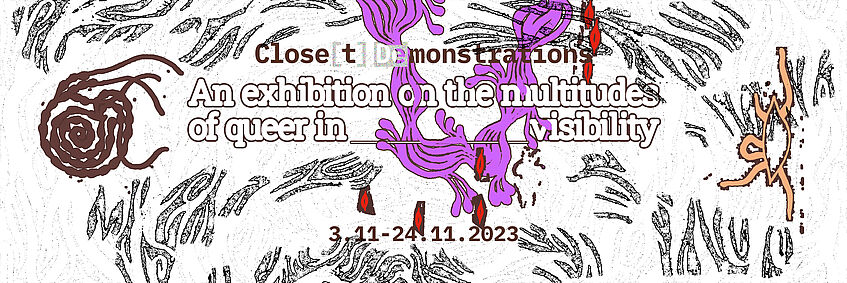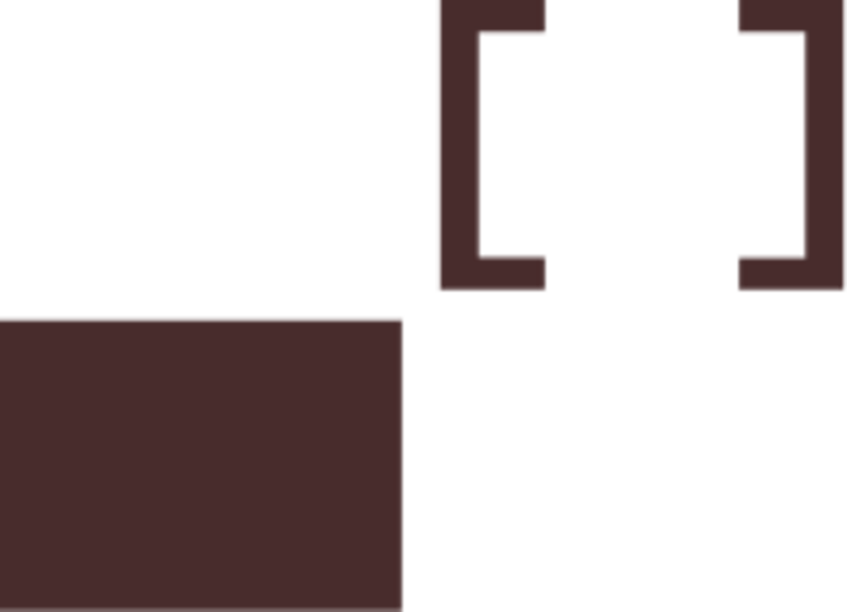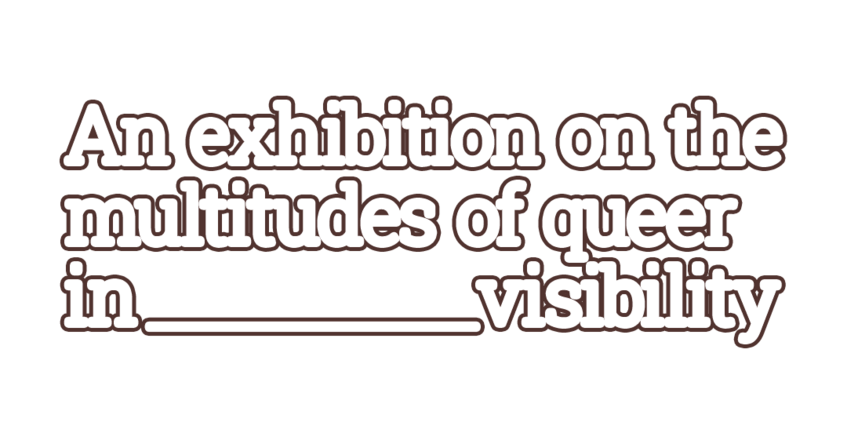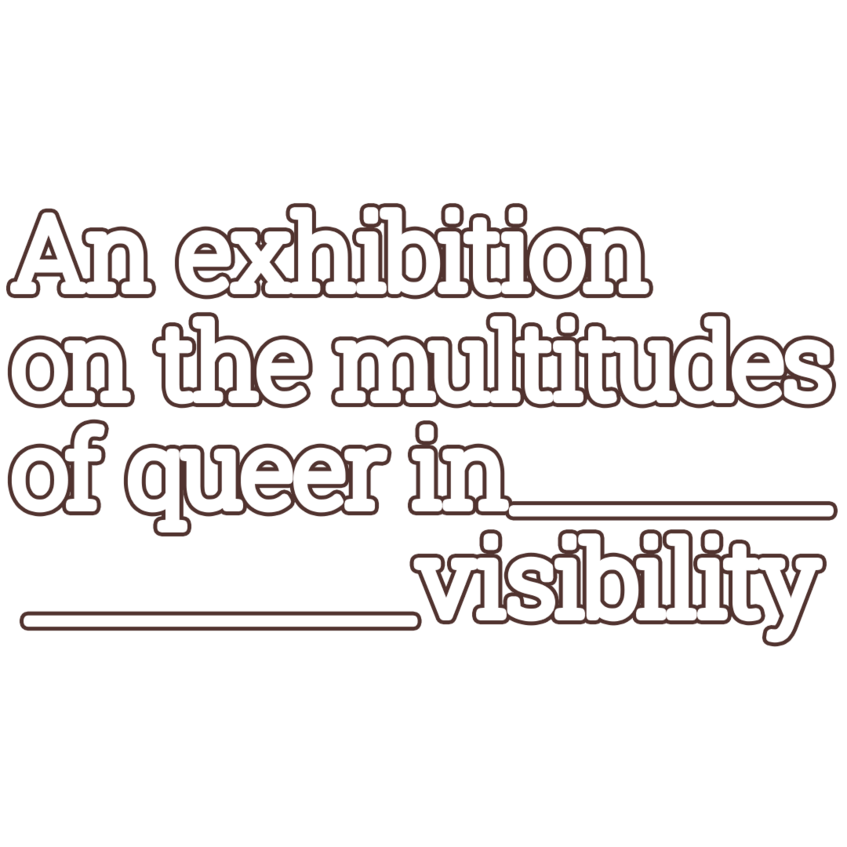Close[t] Demonstrations: An exhibition on the multitudes of queer in_visibility

Semmelweisklinik: Centre for Arts and Culture, Hockegasse 37/4 1180 Vienna, Austria | 3 - 24/11/2023
Close[t] Demonstrations is an art exhibition exploring queer visibilities and invisibilities through drawings, comics, installations, videos, embroidery, and zines. The selected artworks unearth power dynamics, pleasures, and desires involved in queer in_visibilities, and the diverse ways they manifest in different contexts.
The organizers of Close[t] Demonstrations chose a title that playfully introduces and signals elements of transparency, publicness, opacity, invisibility and visibility and their liminalities. Closets and the communities they hold are featured ‘closely’; What it means to be public and to demonstrate for equality becomes reflected; And even monsters are ‘(de)monstrated’ and contained by the title.
The exhibition showcases 18 artworks by artists from Kyiv, Berlin, Vienna, Hamburg, Helsinki, Athens, Erzurum, Dhaka, Dnipro, Mexico City, Johannesburg, Oaxaca, Almaty and London. The Close[t] Demonstrations exhibition space and catalogue are in some combination of Arabic, Austrian sign language, Bangla, Bashkir, Belarusian, Bosnian-Croatian-Montenegrin-Serbian, Brazilian Portuguese, Chinese, Cypriot Turkish, East Frisian, English, Fante, French, Georgian, German, Greek, Hungarian, Italian, IsiXhosa, Kurdish, Nahuatl, Portuguese, Russian, Spanish, Tatar, Turkish, and Ukrainian.
The exhibition program includes guided tours in German with interpreting into Austrian sign language, English, Ukrainian, Bosnian-Croatian-Serbian-Montenegrin and Russian. Moreover, the visitors can participate in performances by Pêdra Costa, a workshop on creative writing through multiple discriminations with Masha Beketova and Syrine Boukadida, a lecture on the relationship between visual and political representation by Elahe Haschemi Yekani and discussions on the conditions of (im)possibility for art creation with Olenka Syaivo Dmytryk and on the optics of queer migration with Tegiye Birey, Ewa Maczynska and Henri Dennis.
In_visibilities
Opacity is a concept borrowed from Édouard Glissant and the Martinican Creole context. Glissant used the concept to refer to the linguistic ingenuity of the Creole locals of Martinique to avoid being understood (and thus being reducible according to Glissant) by their oppressors. Anna T. and the team of the artistic research project "The Magic Closet and the Dream Machine" apply opacity in multiple different ways for queer contexts. It signifies, for example, a queer tactics in the form of secretive queer slangs for people to more safely communicate (AAnna T.’s research). In the framework of the artistic research project "The Magic Closet and the Dream Machine", it was employed as a methodology in creative workshops to exchange knowledge while protecting and respecting people’s privacy. In this exhibition, Anna T. was curious to explore and share how other artists working within queerness would take up the question of in_visibilities in their own practice.
Artists and artworks
The artists express their ideas about in_visibilities linked to individually specific sites or times, and different emotional states and offer nuanced theorisations of queerness in their own setting. Moreover, the aesthetics of their work vary greatly. Vishnia Vishnia a.k.a. Double Cherry’s drawing “Stray Dog” shares their thoughts on the in_visibilities of the site of a gay bar (a vital space for socialisation, entertainment, and community organising) at the time of war. Clémentine Roy and Marta Orlando’s short film “The Pathway to the Goats” investigates cruising and pleasure-seeking outdoors and İlhak Altıparmak’s embroidery pieces “Slippery Reminiscences of Consciousness II” explore similar pursuits in the homosocial space of the hammam. Naomi Frisson in their “PINK ZINE” presents fragments of desires and their depictions accompanied by inner monologues, and gyenjam in '-ডাই-অ্যাস-ফোঁড়া- share a video installation focusing on the perceptive aspects of in_visibility.
For other zinesters, in_visibilities were at play in the very process of art-making. ReSew’s “Textile book of stories about clothes 2” and grouping sil's “zine” both aim at collective creativity and resource-sharing during a time of Russian military aggression. Adiba’s interactive installation “Tartpa'shka” locates in_visibilities in the very nature of memory, archives, and childhood, while Sophia Yuet See’s installation “Iteration of 'coming full circle only to loop back over'” further explores memory through trauma and oppression. Amaqhawekazi Emafini Malamlela’s “Trumu Fetish - The Shrine” video of her performance and Pêdra Costa’s performance-installation “The Deities' Closet” trace invisibilities in supernatural beings and spirituality. Bendix Mignon’s sketches “Das Gefühl, das ich kenne” detects in_visiblity in the materialities of their artistic practice, in the form of omissions, ambiguities and representation (the ephemerality of appearing, or seeing, oneself). Naomi Rincón Gallardo’s film “Verses of Filth” places in_visiblities in the realm of the emotional and articulates connections between in_visibilities and empowerment through mythmaking. Some of the artists speak of the importance of being seen yet not being visible (or forcibly visibilised), especially when existing at the intersection of minorities and iterate the importance of agency especially when fighting against ableism, queer- and transphobia, racism, sexism, and xenophobia; Animal Bro’s comic strip “Transition Diaries" is an example for such an intersectional reflection on in_visiblity. For Jasemin Anika Khaleli and her installation “Uns:mothered (Semmelweisklinik)”, in_visibility was found on the site of material (yet invisible) connections through breathing, which especially in the post-2020 world foregrounds social conditions of power which operate physically, affectively, and environmentally. In a different path, Marina Leo Shamov’s interactive video installation “Dendrocoelum lacteum (Planaria)” traces queer invisibilities in post-humanist transcendence and nature’s ability to overcome limitations.
The artistic research project “The Magic Closet and the Dream Machine” experimented with the production of invisibility and solidarity. Through collective workshops, the research team and their collaborators in 5 post-Soviet regions produced a series of artefacts, which can be seen in the digital archive. Two of these artworks are part of the exhibition: Masha Godovannaya’s experimental film “a text floating on a river” and Ruthia Jenrbekova’s “Deck of Cards”. The device central to this methodology, the Dream Machine, is also exhibited and visitors can experience the effect of this kinetic flicker device in its dedicated room.
Sponsors
The exhibition is supported by SHIFT Basis.Kultur Vienna, the Austrian Research Fund (FWF), the research platform Gender: Ambivalent In_visibilities (GAIN) of the University of Vienna, the Rosa Luxemburg Foundation, the Academy of Fine Arts, Vienna, Gender Research Office of the University of Vienna, and the Students’ Union of the University of Vienna (ÖH), the Culture and Equality office of the University of Vienna and the Equal Opportunities Working Party of the University of Vienna.
The organizers
Anna T.
The exhibition is curated by Anna T., an artist, educator, and curator based in Vienna. Her artistic, curatorial, and scholarly work draw from poststructuralism, queer theory, decoloniality, peripherical knowledge, aesthetics, and affect. Since 2003, she has exhibited internationally and has collaborated extensively with academics, activists, and creatives in Greece, the UK, Germany, and Austria. Her monograph "Opacity – Minority – Improvisation: An Exploration of the Closet Through Queer Slangs and Postcolonial Theory" was published by transcript in 2020 and explores invisibilities through language (https://www.transcript-verlag.de/978-3-8376-5133-1/opacity-minority-improvisation/)
“What drew me to the project when Kathi first reached out was the core interest in invisibilities, something I had explored differently (focusing on languages) which also led me to involve my own artistic practice as a research method. Whereas previously I had focused on collective and creative forms of communication which often afford community membership, this project would be about exploring the diverse artistic takes on queer in_visibilities generally and thus would allow us to invite people whose work we admire to share their creative processes speaking from different contexts. This offered us the opportunity to publish an open call and receive works of artists we didn’t know and receive unexpected answers to what in_visibilities are to them.”
Working languages: English and Greek.
Area of competence: Curation
Contact: curator.gain@univie.ac.at
Katharina Wiedlack
Ass.-Prof. Mag. Dr. Katharina Wiedlack is project leader of the exhibition and the art research project "Magic Closet and the Dream Machine" on the representation of queer life in/from the post-Soviet space. She is Assistant Professor for Anglophone Cultural Studies at the Department of English and American Studies, University of Vienna. She is available for expert commentary and has given interviews on queerness and invisibility (malmoe) and written on gender-sensitive language for Austrian (der Standard) and international (artseverywhere) media.
“This exhibition is unique, because it speaks 30 languages across genders, classes, citizenships and nationalities, races/ethnicities, and sexualities.”
“I am involved in this project because I think art and artists can teach academia a great deal - we just need to listen, look, and feel in the right direction.”
“We need this exhibition, because we need to connect across our differences to forge solidarities, care and support each other. Art can be a means of this connection.”
Working languages: English, German
Area of competence: (Academic) concept, production
Contact: katharina.wiedlack@univie.ac.at
Iain Zabolotny
Iain Zabolotny is an activist, interpreter and researcher from Novosibirsk, RU. They studied Public Relations and Transcultural Communications and are currently studying Interpreting at the University of Vienna. Iain is also a part of the FWF art-based research project "The Magic Closet and the Dream Machine" on East-West solidarity.
Working languages: English, Russian, German
Area of competence: Communications & Translations
Contact (preferred for all media communication): exhibition.gain@univie.ac.at
Tegiye Birey
Tegiye Birey is a text worker and community-enthusiast from the Mediterranean. She is a PhD Candidate in Gender Studies at Central European University and Utrecht University, and her research performs a postcolonial/decolonial feminist reading of migration solidarity. Tegiye has often integrated art to her writing practice (see Devising conviviality: intersubjective becoming through labor of community-building, Being and Understanding the Other: A Brief Look at the 21 st century Cypriot Art). Tegiye has a BA in Women’s Studies and Political Science with a minor in French Studies from the University of New Hampshire, and a MSc in Gender and Social Policy from the London School of Economics and Political Science. She has worked in the field of refugee rights, engaged in gender, history and youth research and training, and taken part in feminist, queer, anti-militarist, and anti-racist networks transnationally.
Working languages: English, Turkish
Area of competence: Facilitation, Hospitality and Logistics
Contact: tegiye.birey@univie.ac.at
Social Media Links
Contact Information
Media inquiries: exhibition.gain@univie.ac.at (Iain Zabolotny)
Logo templates




